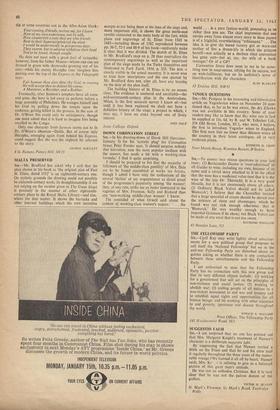DOWN CORONATION STREET
SIR,—In his dressing-down of Derek Hill (Spectator, January 5) for his 'ecstatic plug' for Coronation Street, Peter Forster says, 'it should surprise nobody that television, now the most popular medium with the masses, has made a hit with a working-class formula.' I find it quite surprising.
I should be prepared to bet that the majority of fbllowers of 'the middle-class gentility' of Mrs. Dale are to be found assembled at works tea breaks, though I admit I have only the enthusiasm of the several 'dailies' of my acquaintance as direct proof of the programme's popularity among 'the masses'; they, at any rate, strike me as better instructed in the vagaries of Mrs. Freeman, Sally and Richard than any 'non-working middle-class women' I know.
I'm reminded of what Orwell said about the content of working-class women's papers: . . the
world . . . is a pure fantasy-world; pretending to be richer than you are. The chief impression that one carries away from almost every story in these papers is of a frightful, overwhelming "refinement." ... The idea is to give the bored factory girl or worn-out mother of five a dream-life in which she pictures herself—not actually as a duchess (that convention has gone out)—but as, say, the wife of a bank manager.' Or of a GP?
Coronation Street does seem to me to be some- thing new in soap-operas, relying for its success, not on wish-fulfilment, but on its audience's sense of identification with the characters.






























 Previous page
Previous page